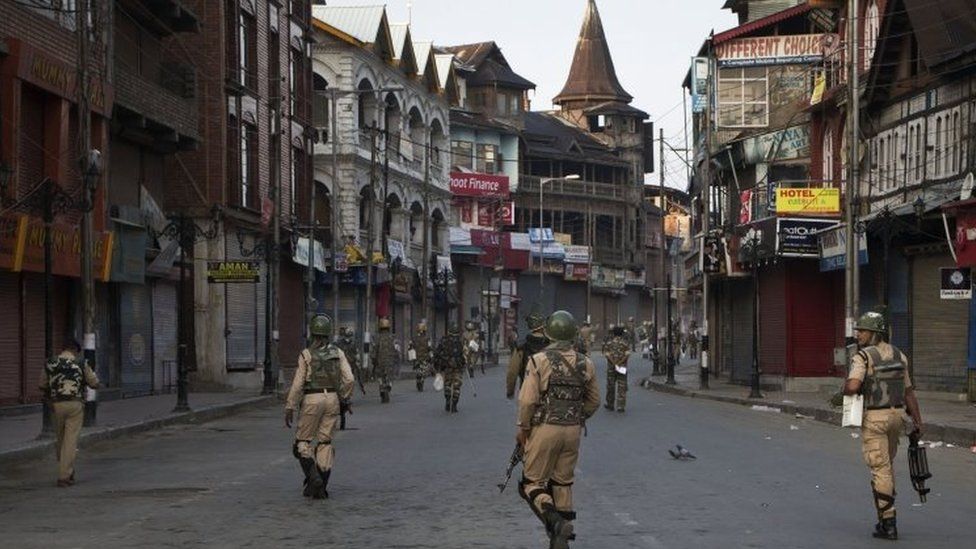Militants attack Indian army base in Kashmir 'killing 17'
- Published

Militants have attacked an army base in Indian-administered Kashmir, killing at least 17 soldiers, the army says.
All four of the attackers were killed. Carrying guns and grenades they stormed a base in Uri, close to the Line of Control with Pakistan in a pre-dawn ambush.
Indian Home Affairs Minister Rajnath Singh reacted by calling Pakistan a "terrorist state".
It is the deadliest attack on security forces in Kashmir in two decades.
It comes as violent protests against Indian rule in the disputed region continue, with a strict curfew imposed.
More than 80 people, nearly all anti-government protesters, have died in more than two months of violence.
No group has claimed responsibility for the attack and Pakistan denied any role.
"This is an old tactic of India. They immediately put the blame on Pakistan without investigation," foreign ministry spokesman Nafees Zakaria told the BBC.
But Mr Singh said on Twitter that "there are definite and conclusive indications that the perpetrators of Uri attack were highly trained, heavily armed and specially equipped".
"I am deeply disappointed with Pakistan's continued and direct support to terrorism and terrorist groups," he said.
UK Foreign Secretary Boris Johnson condemned the attack and said the UK "stands shoulder to shoulder with India in the fight against terrorism, and in bringing the perpetrators to justice".
Both India and Pakistan claim all of Muslim-majority Kashmir but only control parts of it.
Indian army military operations head Lieutenant-General Ranbir Singh said there was evidence the attackers were members of an Islamist militant group in Pakistan.
The terrorists had some items which had Pakistani markings on," he said.
The militants infiltrated across the Line of Control from Pakistan before attacking the base, west of Srinagar, an army officer told the BBC.
Gunfire and explosions were heard for several hours.
Many tents and temporary shelters caught fire during the attack, according to the army's Northern Command.
Twelve soldiers were killed by fires and the others died in gun battles, the Hindustan Times reports, citing army sources.
Disputed Kashmir has been a flashpoint between India and Pakistan for more than 60 years, causing two wars between the neighbours.
A militant attack on an army camp in Uri in December 2014 saw at least nine members of the security forces killed.
The last attack of this scale on the Indian army was in June 2015 in Manipur, north-east India, when at least 20 soldiers were killed in an attack on a troop convoy.
Dangerous impasse - Justin Rowlatt, South Asia correspondent
With the Indian Home Ministry talking about a "cross-border terror attack", there is no doubt the raid will make the already fraught relations between India and Pakistan even frostier.
But the truth is this latest upsurge in violence has a distinctly home-grown flavour.
The huge wave of protests against Indian rule that were prompted by the killing of a popular young militant on 8 July have been overwhelmingly by people from Indian-controlled areas of Kashmir.
The attack is likely to mean normal life in the province will continue to be paralysed by the curfew imposed by the security forces for some time to come.
The Indian government says it wants to discuss how to end the violence with local leaders, but so far its overtures have been rejected by separatists who insist that the issue of Kashmiri independence must be on the table.
- Published16 August 2016
- Published17 September 2016
- Published19 December 2023
- Published5 December 2014
- Published4 June 2015